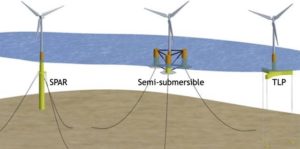SUT US – Floating Offshore Wind Turbines – Comparing Floater Types and Designing Mooring Systems
01 September, 2021
Webinar 0900 CST
Floating Wind is a hot topic in the renewable energy industry. Do you know the differences among floater types such as Semi, Spar, and TLP? What are their pros and cons? Do you want to learn how they are moored/anchored in the middle of an ocean? This technical presentation will give you all the important knowledge about Floating Offshore Wind Turbines (FOWT) and their mooring systems.
We have invited Professor KT Ma of National Taiwan University to give us a talk. Don’t miss this great learning opportunity!
Professional Development Hours
This webinar counts for 1 Professional Development Hour. Certificates will be provided after the presentation.
About the Presenter
 Kai-Tung (KT) Ma, Professor, Ocean Engineering, National Taiwan University
Kai-Tung (KT) Ma, Professor, Ocean Engineering, National Taiwan University
KT started his academic career recently as a full-time professor at National Taiwan University. Before that, he was a Team Lead at Chevron Energy Technology Company in charge of mooring and geotechnical engineering for their floating systems around the world. Accumulated 30 years of experience, he has worked for different organizations including consulting firms and class societies. He had experience working at American Bureau of Shipping (ABS) as a senior engineer in the R&D department. Throughout his career, he has published 35+ papers and 4 patents in the areas of mooring engineering and reliability of marine structures. KT served in API and ISO committees, as a chair and co-chair respectively, developing codes and standards related to station-keeping of offshore structures. Because of his contributions to the industry, he was elevated to the grade of Fellow by Society of Naval Architects and Marine Engineers (SNAME). He has written a textbook “Mooring System Engineering for Offshore Structures”, which was published by Elsevier in 2019. KT earned his BS degree in naval architecture from National Taiwan University, and MS and PhD degrees in naval architecture and offshore engineering from the University of California at Berkeley.
Young Professionals Committee (YPs) and Marine Renewable Energy Committee (MREC)
